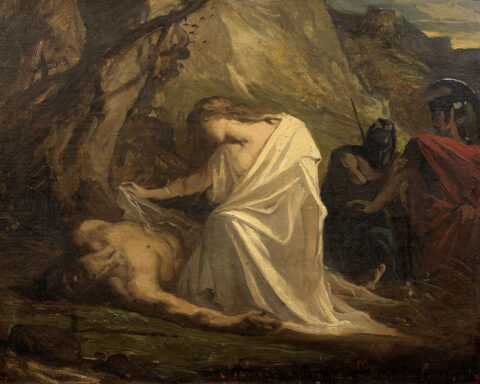In Savannah, Georgia—a beautiful and historic city, as any tourist will tell you—the horse-and-carriage industry is booming. “Find yourself transported to Savannah’s colorful past,” the website reads, “amidst the gentle clip-clop of a mild-mannered Belgian, Percheron, or American Spotted draft horse.” It’s true: the horses are gentle and mild-mannered. Look in their eyes—some wild thing inside them has gone to sleep. The light is out. Their heads bow low—it’s so damn hot, 95 degrees in summer, not adjusted for humidity—and they clip-clop on from ten in the morning to six in the evening like hamsters on a wheel.
Last August, a muscled, dark brown Belgian named Antebellum pulled nine white tourists in a heavy black wooden carriage on a tour of the city squares. They stopped at the intersection of Bull and Perry, just outside Chippewa Square, waiting for the light to turn green. The horse’s long, elegant face was downcast, and it breathed heavily in the heat, a string of cars behind it spitting out fumes. The tourists chatted and pointed at the—beautiful, historic—architecture. Suddenly a precocious squirrel, bound by no one, flew from a tree and bounced off the back of the horse. The squirrel dropped to the ground, and then flew up the next tree.
Antebellum came to life like a man waking up from a coma. He let out a sharp, high-pitched neigh, but to the group from Alabama riding in the carriage, sleepy from their lunch at Paula Deen’s, the sound was like nothing they’d ever heard, like the scream of a tortured man. Antebellum reared up on his hind legs, jostling the carriage violently, and then cantered, his feet slamming against cobblestone, off the road and onto the sidewalk. The carriage, not constructed for sharp turns, lurched onto its left side wheels, sending the driver from his perch onto the street, where he landed on his left wrist with a strangled shout. The Alabam-ers in the carriage screamed, gripping the carriage sides, but the passengers on the right were no match for gravity, and they slid onto the passengers on the left in an awkward coupling.
A pink-haired animation student at the Savannah College of Art and Design was walking to class and found herself directly in the horse’s path. “What the actual fuck?!” she cried, dropping her tablet with a loud clack and darting into a bush. Antebellum, beside himself with fear, his eyes huge, his heart slamming against his majestic chest, reared up again, his front hooves beating against the air. This sent the carriage onto its back left wheel, and the tourists were thrown onto the ground. A heavy woman named Loretta sobbed as she felt her legs and torso, checking for injuries, and although she found none she continued to wail. Her husband Keith crawled to her and threw himself gallantly over her body, the fried cheesecake crumbs on his collar falling onto her breasts, as if protecting her from gunshots. It was the worst thing that had ever happened to them.
At this point the driver, a SCAD drop-out with blonde dreadlocks who went by the name of Marley, saw that it was up to him to save his passengers and collected himself. He crawled up to his perch in front of the carriage, grabbed his back-pack, and found the handgun in the inner pocket. Then he turned and shot Antebellum through the head. The horse’s glistening body shivered. He fell forward onto the sidewalk, his front legs breaking beneath him, and then rolled to his side, his majestic head slamming against the concrete. As Antebellum sucked in one last breath, his huge left eye, as dark and deep as a forest at night, rolled up to see the squirrel high in the oak tree above him, nibbling a pecan and watching.



